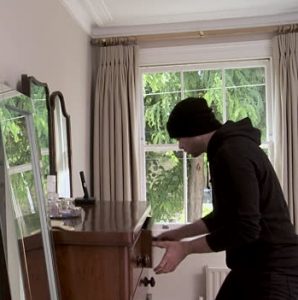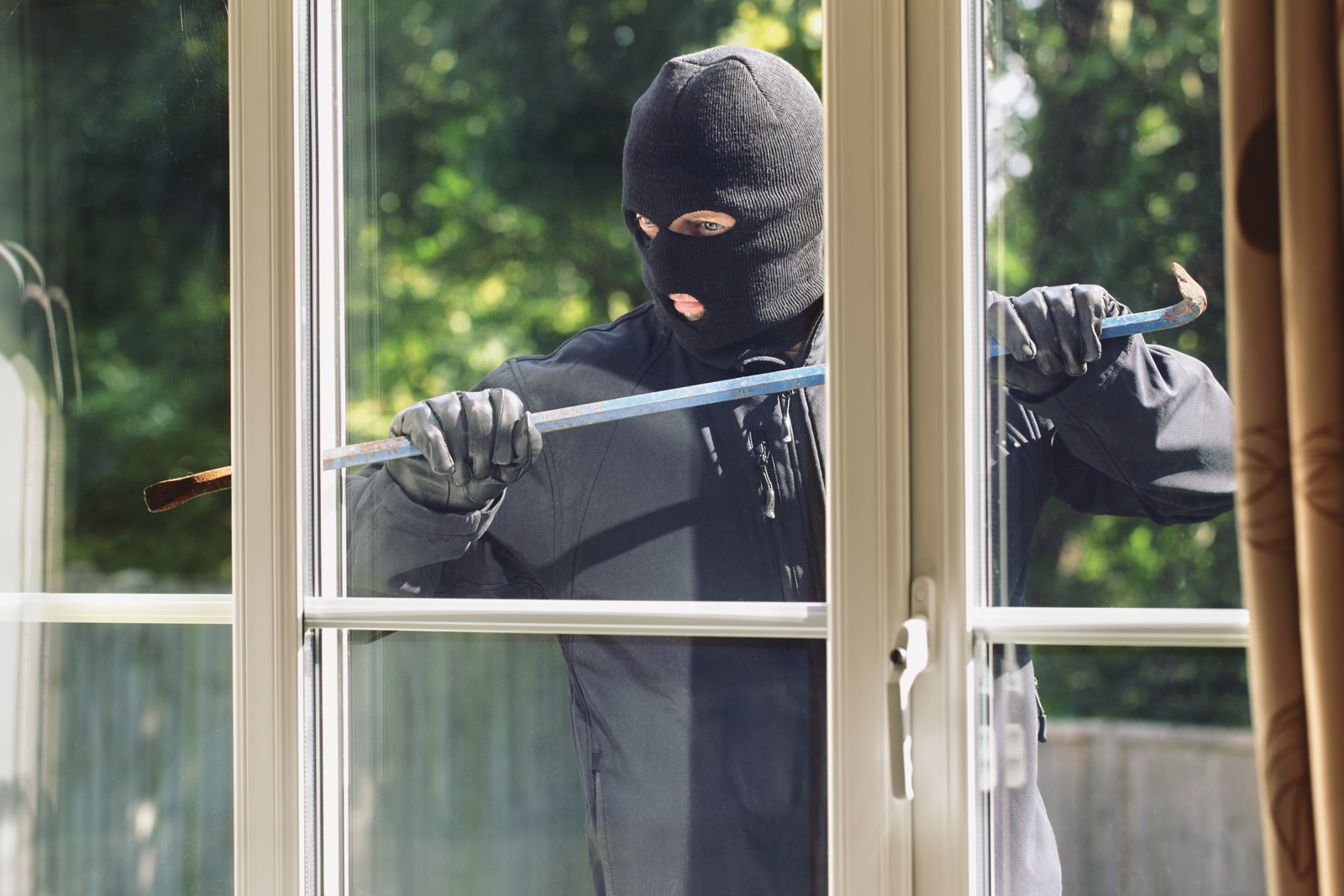 The term burglary is used to describe an unlawful or forcible entry (or attempt entry) of property – it may or may not involve some theft. Though you may not like to think about it, burglary is incredibly common, and any home could be a target. According to recent statistics, a home intrusion occurs in the United States every 13 seconds – that equates to more than 2.5 million home invasions each and every year. You may also be surprised to learn that about 30% of break-ins occur through an unlocked door or an open window.
The term burglary is used to describe an unlawful or forcible entry (or attempt entry) of property – it may or may not involve some theft. Though you may not like to think about it, burglary is incredibly common, and any home could be a target. According to recent statistics, a home intrusion occurs in the United States every 13 seconds – that equates to more than 2.5 million home invasions each and every year. You may also be surprised to learn that about 30% of break-ins occur through an unlocked door or an open window.
Many people are aware of the risk for burglary, but they fall prey to certain myths and misconceptions. For example, you may assume that most burglaries happen under cover of night but, in reality, most burglaries take place during daylight hours between 10am and 3pm. Furthermore, most break-ins are committed by burglars who live within 2 miles of the targeted property. If you think that your home is safe, consider the fact that a burglary can be completed in under 10 minutes and the average loss per burglary is over $2,200. Are you willing to take that risk?
The fact of the matter is that your home is at risk for burglary – all homes are. But there are some simple things you can do to reduce your risk for home invasion. Keep reading to learn about the different types of burglary and their potential impact. You will also learn some simple tips for protecting your home against a break-in.
What Are the Different Types of Burglary?
Many homeowners are woefully undereducated about the reality of burglary and home invasion. Burglary is a kind of property crime, and there are four different types:
- Completed Burglary – A completed burglary is simply the act of gaining entry to a residence by a person who has no legal right to be there. Entry may be achieved with or without the use of force.
- Forcible Entry – This is a form of completed burglary in which the burglar uses force to gain entry – typical examples include breaking windows.
- Attempted Forcible Entry – An attempted forcible entry involves the use of force to gain entry to a property, but entry is not completed successfully.
- Unlawful Entry without Force – This type of burglary involves entering a property by a person who has no legal right to do so but who does so without the use of force.
How Might a Burglary Affect You?
The effects of burglary may seem obvious to you, but a home invasion could have an impact on you and your family in ways you might not predict. Here is a list of the ways a burglary could affect you, your family, and your home:
- When someone invades your home, it may feel like a personal invasion – just knowing that someone else has been in your home without your permission can be devastating.
- In many cases, burglaries involve the destruction of property – in addition to feeling violated you may also find yourself dealing with physical repercussions from the burglary.
- Once your home has been burglarized, you may no longer feel safe – even if you take additional measures to secure your home against subsequent burglaries.
- Dealing with the aftermath of a burglary can be emotionally and financially taxing – your home insurance premium could go up, and you may not be covered for the cost of all damages and losses.
- In some cases, burglary could involve the loss of personal items that cannot be replaced – this adds extra depth to the sense of loss and violation you may feel.
Every burglary is a unique circumstance so the effects may vary from one instance to another. In the next section, you will receive some simple tips for protecting your home against a break-in.
How Can You Protect Your Home Against a Break In?
- Make it look like you’re at home. Though burglaries still happen when the resident is home, many burglars will avoid a property if it looks like someone is inside. Keeping some of the lights on when you leave the house and hooking them up to an automatic timer can make your house look occupied, even when you aren’t there.
- Don’t broadcast your travel plans. In addition to making it look like you are home when you are not, avoid advertising the dates and times when you will be away from home. As tempting as it may be to brag about your upcoming vacation on social media, you never know who might get ahold of that information and use it to their advantage in a burglary.
- Invest in deadbolts. The average burglary is completed in under 10 minutes because many homeowners leave their doors and windows unlocked, giving the burglar easy access. Installing deadbolt locks gives you an added layer of protection because it will take a burglar that much longer to gain access to your home and he may decide that it isn’t worth the extra time and effort. Choose deadbolts that are designed to resist tampering. You may even want to consider electronic door locks.
- Keep your valuables out of sight. Leaving your blinds open at night gives a burglar a clear view of all of the things he could steal. Keeping your valuables out of sight is an easy way to deter burglars because they won’t know for sure whether it is worth it to break into your home. You should also keep a record of your valuable property, so you have something to show your insurance company in the event of theft. It will also help the police to identify stolen items that turn up later.
- Buy security cameras. Having a system of security cameras setup may be enough to convince potential burglars that it isn’t worth the risk to target your home. If someone burglarizes your home anyway, your security video may suffice to help the police identify the burglar. Some security cameras can even be hooked up to motion sensing technology, so they don’t run continuously.
- Don’t let your mail pile up. Even if you are good about not sharing your travel plans, there are still plenty of ways that a burglar can tell if a home is vacant. If you leave town but forget to stop your mail or cancel your newspaper delivery, things could pile up and act as a neon sign advertising the fact that you aren’t home. It is easy to stop your mail, so don’t rely on a neighbor to remember to bring it in for you.
- Keep your property well lit. Although it is true that many burglaries occur during daylight hours when people are away at work, many burglaries do happen under cover of night. Keeping your property well-lit with spotlights and path lighting can go a long way toward deterring potential burglars. You should also consider investing in motion-activated lights.
- Start a neighborhood watch program. If you live in an area that already has a neighborhood watch system in place, you are lucky. If your neighborhood doesn’t have one, consider talking to your neighbors and the homeowners’ association about creating one. When all of the homeowners in a neighborhood become more vigilant, it increases safety and security for all.
- Secure your doors and windows. As it was mentioned earlier, a significant percentage of burglaries occur through unlocked doors and open windows. Consider securing your entry points with alarms and make sure to keep everything locked up when you are at home and when you are away. And don’t forget about sliding doors! Secure them by placing a rod along the runner to keep it from being forced open.
- Get a dog. Even if your dog is the gentlest, nicest dog around, sometimes simply having a dog at home is enough to deter a burglar. The dog might not attack the burglar if he enters the home, but he might bark to alert you that someone is attempting entry. Large dogs are more intimidating for their size and because they have a loud, deep bark. But even small dogs can be effective guard dogs because they will bark at anything that moves.
Everyone wants to feel safe in their home but, unfortunately, burglaries are common, and they cannot always be prevented. What matters most is that you do everything you can to protect your home and your family against a break-in and, in many cases, those things may be simpler than you previously imagined. Put the information you’ve learned here to work in protecting your home.







1 thought on “Tips for Preventing a Home Burglary”